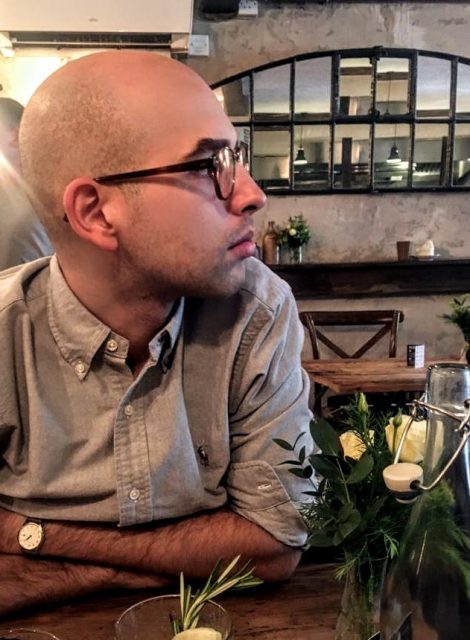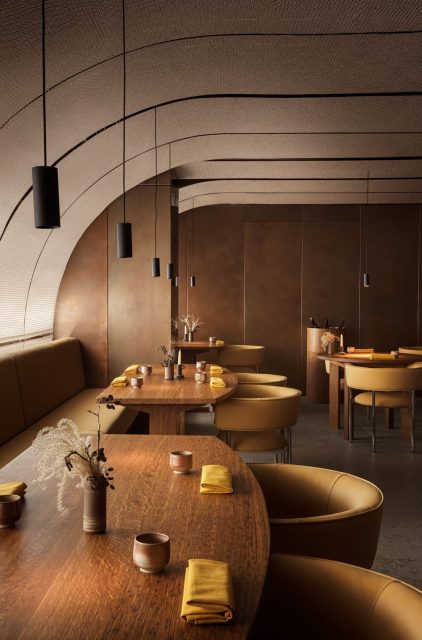This website uses cookies so that we can provide you with the best user experience possible. Cookie information is stored in your browser and performs functions such as recognising you when you return to our website and helping our team to understand which sections of the website you find most interesting and useful.
Unfiltered: Lorenzo Lentini, Ikoyi
The head sommelier of the two-Michelin-starred Ikoyi, replete with a much expanded cellar at its new premises on The Strand, talks to Douglas Blyde about the UK being a “land of possibility”, a love for “patterns” including when it comes to pricing wines, and the potential of sake.

What is your vintage?
1991, from which I tried a bottle of Domaine Georges Vernay Coteau de Vernon, an experience which I wish I could hold on to. I also have a bottle of Malvasia D’Oliveiras 1991 Madeira waiting for me.
What was the first wine to move you?
From Pantelleria, Serragghia Zibibbo Gabrio Bini 2014. Would it move me today? I don’t know. But I vividly remember the emotions I felt that night and the flavour of the wine.
What bottle would you reach for if the nuclear button was pressed?
A bottle of my father’s garage wine from when I was little. A wine which he rarely made from an unknown mix of grapes taken from a few rows of wines which he owned. It influenced my life more than I would have expected.
Why did you change your vocation from medicine to wine?
University wasn’t in my mindset, so in 2015, I left Italy for the land of possibility that the UK represented for me. I started working behind the bar in a restaurant, and slowly, my passion for beverages developed, and, with that, my understanding that wine has plenty to give. Wine is a pharmakon which can be good or bad, but I will let every one of us decide how much of it to use.
Where did you work before Ikoyi?
Davies and Brook at Claridge’s, which is where I was approached by one of our suppliers who mentioned that there was a restaurant which wanted to focus its beverage selection more towards wine: that restaurant was Ikoyi. I always wanted to work in a place renowned for its cuisine, and I like seeing people who are as excited about food as I am.
Describe your wine list?
My sommelier formation started with Fera at Claridge’s, which focused all its wine selection on small growers. From there, I learnt the power of self-expression. In today’s wine world, this is very well represented by small growers scattered around the globe who sometimes show the best of what their land can offer.
Why does every price end with an “0” or a “5”?
I like patterns; there is a complete feeling around them. I could have taken the opposite road and had all the wines with different price ends, but it would be much more labour-intensive to ensure there was a hidden logic behind it.
How come you do not list English wine, despite the kitchen featuring English produce?
I think great English wines are out there, and I have listed some in the past, though I haven’t yet found something in the same price range to compete with what I’m listing from Champagne. The decision to feature local products plays an essential role in the fresh, powerful, and bold flavour of our dishes. Wine is less affected by locality, so we don’t feel the urgency to focus on it.
How important is sake to you and your guests?
Sake gives us an enormous versatility for pairing with our spiced, umami-based cuisine. Before, we used to work only with one sake supplier because my knowledge of this beverage was extremely limited, and I needed guidance. At present, we have just developed a full sake pairing. We extended our selection thanks to the support of another supplier, Tengu. Ikoyi is a destination for people who want to try highly selected products without preconceptions. All the sakes which are in our selection fall under this category.
What do you offer via Coravin?
Coravin Sparkling allows us to offer three Champagnes by the glass, which would not be possible before its release.
How does the cellar space differ compared to the previous incarnation of Ikoyi?
While every sommelier will tell you that their cellar is limited no matter how much storage they have been given, our previous location barely had any wine space. There were benches and cabinets where we kept 150-200 bottles. While our space is still limited today, we can easily store around 800 bottles for our medium-sized list.

What is it like working with Jeremy Chan and Iré Hassan-Odukale?
They have very different personalities, but if I had to summarise my whole experience, I’d say they are both very human and people-oriented. Iré always finds the time to listen, even at the most improbable time and location. Jeremy gives guidance not only to the kitchen team but also for the front of house. He is extremely precise and knows exactly what he wants, but his last thoughts are always oriented towards his team and his guests.
Describe Chan’s cuisine?
Jeremy’s cooking is connected to traditional flavours from around the world, which are combined in an intricate play of spices. He takes inspiration from his personal experiences: family, different journeys, people and what surrounds him. They are a perfect form of inspiration from which he can extrapolate the best.
What has been a memorable match?
Spiced berry and beetroot sorbet with 2014 Ridge Geyserville Essence.
What does he like to drink?
Champagne, red Burgundy, and white Jura.
What is your favourite digestif?
Amaro + ristretto. I like bittersweet flavours and the story behind every single amaro, from the most commercial to the most recent.
Describe the playlist at Ikoyi?
Personal and inspired by the day. We have a selection of nostalgic rock songs, but it also changes based on the mood of the day.
Which is the best table in the house?
If you want a cosy table, we have a nice one in the corner, and a bigger one in a private section of the dining room which seats up to six guests. My personal favourite is the first big table next to the terrace. I like to sit side-by-side with the person I’m dining with to have a lot of space. You can also see the whole dining room from there.
What mindset should guests have to get the most out of the Ikoyi experience?
Most of them already have the best mindset. They come for flavours, which are difficult to find elsewhere. We serve spice-based food, so maybe I’d just suggest keeping in mind because Ikoyi cannot exist without spices.
What was the last exhibition you went to?
“Chagall and me!” in Nice. I always liked his intuitive and kind way of expressing his life and feelings. It was nice to see how other artists who perform in different types of arts can be influenced by the Russian-French artist.
What are your hopes for the future?
Short-term, a team which wants to spend their time at the restaurant. Long-term, to be able to be one of the promoters of a more organised and thoughtful hospitality industry.
Finally, what qualities do you seek in potential sommelier hires?
An interest in beverages. Not just wine, but also sake, tea, spirits and coffee. Understanding that Ikoyi is a restaurant where people come for the selection of food and beverages. We are there to support them during the three-hour tasting menu.
Ikoyi – 180 Strand, Temple, London, WC2R 1EA; 020 3583 4660; reservations@ikoyilondon.com; ikoyilondon.com
Throughout October, Ikoyi is participating in Sake Seafood Sensations, a campaign showcasing the harmony and compatibility of sake with seafood.
Related news
Burgundy 2023 en primeurs: cautious optimism
Fashion brands continue to stir up the drinks market
Turbulent year for fine wine affects revenues at Berry Bros. & Rudd

